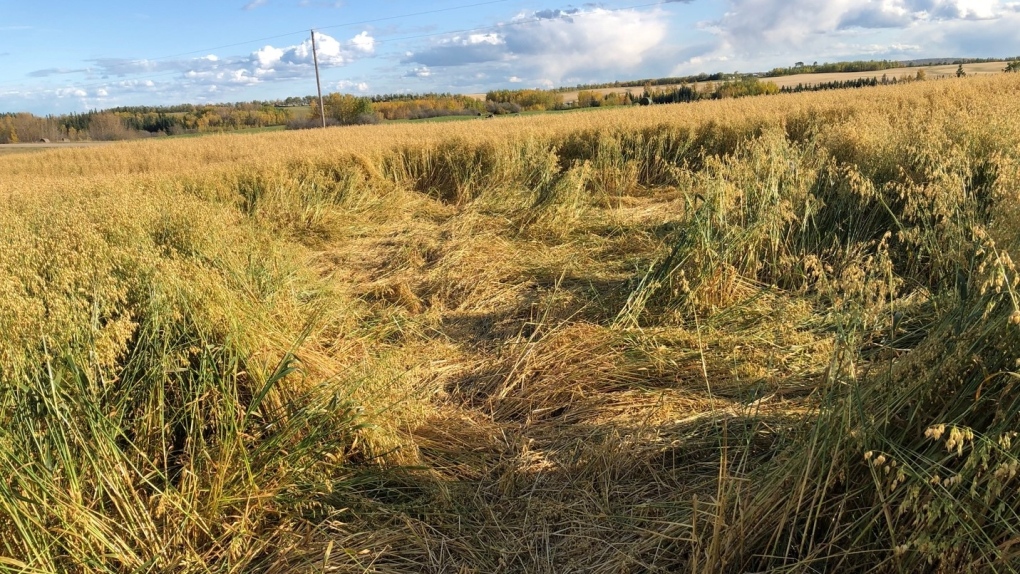'A threat': Alberta offers $75 bounties for hunting, trapping wild boar
The Alberta government has placed a price on the heads, and more specifically the ears, of wild boar which have now been reported in 28 rural municipalities.
“Wild boar at large are a threat to our animals and environment, as well as a vector for diseases like African swine fever," said Agriculture Minister Nate Horner in a Tuesday announcement.
"We are taking action to get rid of this menace and help those affected by it before it gets worse.”
The bounty is in effect in the County of Stettler and the Municipal District of Peace.
Hunters who kill the animals in those areas can claim $75 per set of ears turned in to the government.
Trappers who are government approved can make $75 per set of ears, with the expectation they will eliminate whole sounders, or herds.
Landowners who work with trappers can also receive $75 per set of ears.
"They were imported into the province in the 70s and 80s as a means of diversifying livestock operations," said Bruce Hamblin with Alberta Agriculture, Forestry, Rural Economic Development.
There were few regulations at the time and it was thought that the animals could not survive in the Alberta wild, Hamblin explained.
It turned out that the species not only survived, it now appears to be thriving. The government has since classified the animals as "pests."
"Wild boar did manage to escape, and we have no real number of wild boar that are at large in the province," Hamblin said.
'IT'S ACTUALLY A DELICIOUS MEAT'
Brandon Berry has been hunting wild boar for 15 years. His family owns a ranch in south Texas, where feral hogs damage fences and land.
"We hunt them a lot like deer. We put out a few bags of corn. They'll come to corn from about eight miles away. And you sit in a truck or a blind and try to get as many as you can," Berry told CTV News Edmonton.
"I might get 10 in a night. I might get 15 in a night."
 Brandon Berry, a rancher who hunts feral hogs in Texas, in an interview with CTV News Edmonton on April 5, 2022.
Brandon Berry, a rancher who hunts feral hogs in Texas, in an interview with CTV News Edmonton on April 5, 2022.
Farmers and ranchers in Texas have reported problems with the animals as far back as the 1980s, and a recent count estimated there are 2.5 million feral hogs in the state.
The invasive animals are becoming harder to kill, Berry said, as they get to know the sounds of vehicles and humans.
"They're actually really smart. The first time you hunt a certain group of them, they're not gonna know what's happening. But eventually they're gonna figure out the sound of the truck, the sound of you slamming a door," Berry explained, adding they're easier to trap.
"I eat most of the ones that I kill. It's really tasty."
The government has an information page on how to recognize signs of boar activity.
 A photo of crop damage caused by wild boar. (Source: Government of Alberta)
A photo of crop damage caused by wild boar. (Source: Government of Alberta)
People who have boar damage to their property or trapping areas may also be eligible for government money.
The trapping program is already underway and runs until March 31, 2024.
The hunting program is scheduled to wrap up on March 31, 2023.
Both will be reevaluated and possibly extended if they're successful.
With files from The Associated Press and CTV News Edmonton's Alison MacKinnon
CTVNews.ca Top Stories

BREAKING Real GDP per capita declines for 6th consecutive quarter, household savings rise
Statistics Canada says the economy grew at an annualized pace of one per cent during the third quarter, in line with economists' expectations.
W5 Investigates A 'ticking time bomb': Inside Syria's toughest prison holding accused high-ranking ISIS members
In the last of a three-part investigation, W5's Avery Haines was given rare access to a Syrian prison, where thousands of accused high-ranking ISIS members are being held.
Class-action lawsuit on 'opioid-related wrongs': Court to rule on drug companies' appeal
Canada's top court will rule Friday on the appeal of a class-action lawsuit meant to recoup some of the costs associated with British Columbia's opioid crisis from major drug makers and distributors.
As Australia bans social media for children, Quebec is paying close attention
As Australia moves to ban social media for children under 16, Quebec is debating whether to follow suit.
Irregular sleep patterns may raise risk of heart attack and stroke, study suggests
Sleeping and waking up at different times is associated with an increased risk of heart attack and stroke, even for people who get the recommended amount of sleep, according to new research.
California man who went missing for 25 years found after sister sees his picture in the news
It’s a Thanksgiving miracle for one California family after a man who went missing in 1999 was found 25 years later when his sister saw a photo of him in an online article, authorities said.
Trudeau Liberals' two-month GST holiday bill passes the House, off to the Senate
The federal government's five-page piece of legislation to enact Prime Minister Justin Trudeau's promised two-month tax break on a range of consumer goods over the holidays passed in the House of Commons late Thursday.
Nick Cannon says he's seeking help for narcissistic personality disorder
Nick Cannon has spoken out about his recent diagnosis of narcissistic personality disorder, saying 'I need help.'
Notre Dame Cathedral: Sneak peek ahead of the reopening
After more than five years of frenetic reconstruction work, Notre Dame Cathedral showed its new self to the world Friday, with rebuilt soaring ceilings and creamy good-as-new stonework erasing somber memories of its devastating fire in 2019.

































